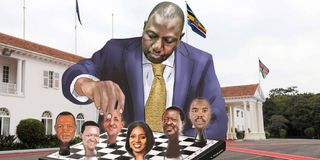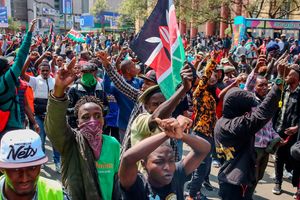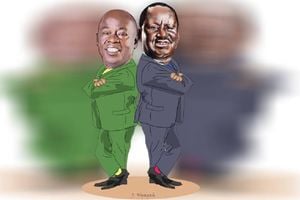
President William Ruto is facing a dilemma over the performance of his Cabinet Secretaries.
It should have been evident from the word go that Cabinet Secretary for Agriculture Mithika Linturi would have an easy ride in his impeachment trial.
Members of the National Assembly’s special impeachment committee drawn from President William Ruto’s governing Kenya Kwanza Alliance coalition may have been under instructions to go easy on Mr Linturi, making nonsense of earlier reports that the CS had been abandoned to his fate.
If, indeed, the President quietly whipped his MPs to save the Agriculture CS, he spared himself the agony of being forced to dispense with a member of his cabinet against his will. If the President does need to dispense with any member of the Cabinet or other senior official, the message is that it will be on his volition and not one forced on him by Parliament or public pressure.
The downside of that, however, is that President Ruto will be perceived as protecting and shielding corrupt and incompetent appointees. And that could come with a heavy political price.
Destined for the fall
It is noteworthy that when Mr Linturi seemed destined for the fall at inception of the impeachment trial, politicians from his home county of Meru were mobilised to agitate in his defence. The drama moved from the National Assembly’s committee room to political opera when some Members of the County Assembly in Meru publicly demanded that President Ruto intervene to save the only member of the Cabinet from their community. They went to the extent of threatening to withdraw support for the Kenya Kwanza administration if Mr Linturi was impeached.
If the President did, indeed, succumb to blackmail from village politicians, that cannot be a demonstration of his grip on power. It is a reflection of his own weakness and the fragile state of his UDA party and the wider Kenya Kwanza coalition. President Ruto likes to put on displays of strength and control but the reality is that competing interests in his coalition often leave him little room for manoeuvre. The question is whether corrupt or incompetent officials remain in office because they are untouchable, or because the President is happy working with them.
President Ruto’s retention of tainted officials is in stark contrast to the two predecessors his cheerleaders would dismiss as much weaker.
Early on in his term, President Mwai Kibaki he established the principle that any minister mentioned adversely in criminal or other probe would have to step aside. Among those forced to relinquish office in 2006 so they do not interfere with investigations were powerful cabinet ministers such as Prof. George Saitoti over the Goldenberg scandal and Kiraitu Murungi and David Mwiraria over the Anglo Leasing scam. Current National Assembly Speaker Moses Wetang’ula also had to step aside in 2010 over the Tokyo Embassy procurement scam.
In 2015, President Uhuru Kenyatta suspended CSs Kazungu Kambi, Michael Kamau, Davis Chirchir (now Energy CS) and Felix Koskei after they were mentioned in Ethics and Anti-Corruption Commission investigations. Also forced out were a large number of principal secretaries and heads of state corporations.
Public Officer Ethics Act
Both of President Ruto’s predecessors acted in accordance with the Public Officer Ethics Act, which demands that one under investigation vacate office until cleared. Under the Ruto government, however, the principle has been subverted so that a criminal suspect can remain in office even while facing trial and even after conviction until all appeals are exhausted.
Indeed, it sometimes seems that coming laden with ethical questions or having faced criminal proceedings is a badge of honour in the curriculum vitae of anyone seeking high-level government appointments.
It may well be a credit that the President is loyal to the men and women who have stood with him but, ultimately, it is he will take direct responsibility for their failures and iniquities. Come the next elections, in 2027, and it is President Ruto who will be put on trial by voters as he seeks a second term.
* * *
Deputy President Rigathi Gachagua this week came out strongly in support of the ‘One Man, One Vote, One Shilling’ mantra supposedly meant to ensure a fairer share of the national cake for the populous Mt Kenya region.
Fair, enough, he is entitled to voice his opinion, but was he enunciating government policy or making demands on the administration in which he is second-in-command? Was he speaking as Deputy President of Kenya or deputy president of the Gikuyu, Embu, Meru agglomeration?
He was, probably, reacting to shifting ground in his home ground, where support for Kenya Kwanza seems to be dwindling.










